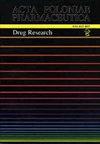EVALUATION OF THE CARIOGENICITY OF PREBIOTIC (1→3)-α-D-GLUCOOLIGOSACCHARIDES
IF 0.4
4区 医学
Q4 PHARMACOLOGY & PHARMACY
引用次数: 0
Abstract
One of the important features of prebiotics is their beneficial effect on the health of the host, which consists in the inhibition of the growth of harmful bacteria, including strains causing caries. The aim of the present study was to evaluate the cariogenic potential of a hydrolyzate of (1→3)-α-D-glucan (GOS) isolated from fruiting bodies of Laetiporus sulphureus, consisting of (1→3)-α-D-glucooligosaccharides (85.6%) and glucose (14.4%). The study was conducted in cultures of cariogenic bacteria belonging to the genus Streptococcus (S. mutans CAPM 6067, S. sobrinus DSMZ 20381, S. sobrinus/downei CCUG 21020, and S. sanguis ATCC 10556). The investigation of the cariogenicity of GOS included examination of the influence of the preparation on the growth of the above mentioned bacteria, their ability to synthesize mutan, and the formation of a sucrose-dependent biofilm. GOS significantly inhibited the growth of the investigated streptococci, and the observed beneficial effect was stronger than the changes induced by a commercial prebiotic preparation containing a mixture of fructooligosaccharides (FOS). Furthermore, GOS inhibited the mutan synthesis by the above mentioned bacteria but did not exert an impact on the formation of artificial dental plaque. In conclusion, the studies conducted showed low cariogenicity of GOS and confirmed the safety of its use as a dietary supplement.益生元(1→3)-α- d -低聚糖的龋性评价
益生元的一个重要特征是它们对宿主健康的有益作用,这包括抑制有害细菌的生长,包括引起龋齿的菌株。摘要本研究旨在评价从硫酸Laetiporus suureus子实体中分离得到的(1→3)-α- d -葡聚糖(GOS)水解产物(1→3)-α- d -葡聚糖(GOS)(85.6%)和葡萄糖(14.4%)的致龋性。该研究是在链球菌属的蛀牙细菌(S. mutans CAPM 6067, S. sobrinus DSMZ 20381, S. sobrinus/downei CCUG 21020和S. sanguis ATCC 10556)中进行的。GOS致癌性的研究包括考察GOS制剂对上述细菌生长的影响、对其合成诱变物的能力的影响以及对蔗糖依赖性生物膜形成的影响。GOS显著抑制了所研究链球菌的生长,并且所观察到的有益效果强于含有低聚果糖(FOS)混合物的商业益生元制剂所引起的变化。此外,GOS抑制了上述细菌的突变体合成,但对人工牙菌斑的形成没有影响。综上所述,研究表明GOS的致癌性低,证实了其作为膳食补充剂的安全性。
本文章由计算机程序翻译,如有差异,请以英文原文为准。
求助全文
约1分钟内获得全文
求助全文
来源期刊
CiteScore
0.80
自引率
0.00%
发文量
74
审稿时长
6-12 weeks
期刊介绍:
The international journal of the Polish Pharmaceutical Society is published in 6 issues a year. The journal offers Open Access publication of original research papers, short communications and reviews written in English, in all areas of pharmaceutical sciences. The following areas of pharmaceutical sciences are covered: Analysis, Biopharmacy, Drug Biochemistry, Drug Synthesis, Natural Drugs, Pharmaceutical Technology, Pharmacology and General.
A bimonthly appearing in English since 1994, which continues “Acta Poloniae Pharmaceutica”, whose first issue appeared in December 1937. The war halted the activity of the journal’s creators. Issuance of “Acta Poloniae Pharmaceutica” was resumed in 1947. From 1947 the journal appeared irregularly, initially as a quarterly, then a bimonthly. In the years 1963 – 1973 alongside the Polish version appeared the English edition of the journal. Starting from 1974 only works in English are published in the journal. Since 1995 the journal has been appearing very regularly in two-month intervals (six books a year). The journal publishes original works from all fields of pharmacy, summaries of postdoctoral dissertations and laboratory notes.

 求助内容:
求助内容: 应助结果提醒方式:
应助结果提醒方式:


